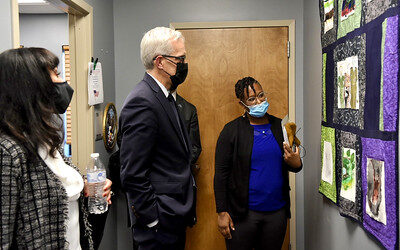Immunization levels against respiratory syncytial virus (RSV) among older adults remained relatively low at around 24% as of late March. As a comparison, national coverage with influenza vaccines for all U.S. adults was 48.3% in the same time period, 2% higher than last year.
Overall Survival Improves With Adjuvant Pembrolizumab in RCC
A third prespecified interim analysis of the KEYNOTE-564 trial has determined that adjuvant pembrolizumab after surgery was associated with a significant and clinically meaningful improvement in overall survival, as compared with placebo, among participants with clear-cell renal-cell carcinoma at increased risk for recurrence after surgery.
Increased Molecular Identification Updates Renal Cell Carcinoma Classifications
Forty years ago, the only recognized form of kidney cancer was renal cell carcinoma (RCC). Today, RCC still accounts for more than 90% of malignancies in the kidney, but now the World Health Organization (WHO) delineates 21 subtypes, with significant differences in aggressiveness and treatment options.
VA Looks Deeper at Treatment Selection in Metastatic Prostate Cancer
Veterans face twice the risk of prostate cancer compared to those who have never served, with approximately 15,000 veterans diagnosed with the disease annually. Breakthroughs in treatment have allowed those patients to live longer than ever and swelled the number of veterans with prostate cancer receiving care through the VHA to nearly 500,000.
Environmental Exposure Linked to Blood Cancer Risk in Veterans
Study Shows Link Between Agent Orange and MPNs A recent study has linked the development of polycythemia vera and other MPNs—essential thrombocythemia (ET) and primary myelofibrosis (MF)—with exposure to the herbicide Agent Orange. Among patients with MPNs,...
Should Cytoreductive Therapy Be Used in Younger PV Patients?
Younger patients with polycythemia vera are often symptomatic and suffer impaired quality of life, reduced work productivity and excess mortality compared with age-matched controls, according to a new study.
Psychoactive Drug Ibogaine Effectively Treats TBI Complications
The signature injury of U.S. veterans from recent military conflicts, traumatic brain injury (TBI) is a leading cause of injury-related disability.
Buprenorphine for Post-Surgical Pain, OK for Opioid-Use Disorder Patients
Opioid-use disorder (OUD) has been referred to as a battle that takes more lives every year than the Vietnam or Korean wars.
Lung Cancer Survival Rates in Federal Medicine Compare Well to Community
Survival rates are rising for veterans diagnosed with lung cancer within the VHA and, unlike in the general population, Black veterans are benefiting as much or more than white ones.
Intensive Therapy Is Effective Treatment for Frail Multiple Myeloma Patients
For frail patients with multiple myeloma, receiving more intensive therapy, triplet bortezomib-lenalidomide-dexamethasone (VRd) rather than doublet lenalidomide-dexamethasone (Rd), is a more-effective treatment, according to a recent study of patients treated in VA facilities.
CDC: More Research Needed on High Melanoma Rates in AI/AN People
Non-Hispanic American Indian/ Alaskan Native (AI/AN) people have the second-highest rate of melanoma in the United States after non-Hispanic white people.
Monoclonal Antibodies Are Promising for Improving MM Survival Time
The last 20 years have brought many more therapeutics for multiple myeloma (MM).
Editorial Director
Thanks to cutting-edge efforts to use targeted testing and strict guideline-adherence, the care of patients with serious illnesses is arguably better than ever at the VA and military healthcare systems.
Mortality Up in VHA Inpatients With COVID-19 Plus Hospital-Acquired Infections
Pseudomonas aeruginosa (PA), an opportunistic pathogen commonly associated with healthcare-associated infections, has a high mortality rate. The organism’s high virulence and ability to rapidly acquire resistance to antibiotics make PA infections a treatment challenge.
Nearly 20% of Veterans Showed Decline During COVID-19 Pandemic
While most U.S. veterans maintained or improved physical and mental function a year into the COVID-19 pandemic, almost 20% showed a decline, according to a new study.
Gout Largely Treatable, but a Considerable Burden in Older Veterans
One of the earliest recorded and most intensely painful diseases, gout was historically called the “disease of kings.” For centuries, it was thought to affect only the wealthy and aristocratic.
VA Clinicians Tackle Issue of Defining and Combatting ‘Diabetes Distress’
The term “diabetes distress” is used to describe the emotional response to living with diabetes, a life-threatening illness that requires chronic and demanding self-management.
Targeted Therapies for CLL Widely Used at VA; Prolonged Survival
U.S. military veterans with chronic lymphocytic leukemia (CLL) routinely received therapies in line with current evidence-based treatment practices over the past two decades, and those who were treated with targeted therapies had longer overall survival, according to a national VA study with more than 20 years of clinical data.
New Guidelines Address Use of Topical Ruxolitinib in Atopic Dermatitis
Using topical ruxolitinib cream to treat atopic dermatitis decreases the need for other AD treatments, according to new research.
Atopic Dermatitis, Other Skin Issues Are Challenging for U.S. Military
Military servicemembers are often exposed to drastic climates, environments, and living conditions which may make them more susceptible to cutaneous diseases, according to a new study.
NIH Study Leads to First FDA Approval for Rare Immunodeficiency Syndrome
A phase III study led by a researcher at the National Institutes of Health (NIH) has resulted in the first approval of a drug for activated phosphoinositide 3-kinase delta (PI3Kδ) syndrome (APDS), a rare congenital immunodeficiency syndrome.
Bladder, Kidney Cancer Rates Lower in Younger Servicemembers vs. Civilians
Younger military servicemembers have lower rates of bladder and kidney cancer than a similar civilian cohort, but that appears to change with age.
Many Veterans With Diabetic Kidney Disease Might Remain Undiagnosed
The authors of a new study suggested their findings might warrant a revision of diabetic kidney disease (DKD) patient identification and management in U.S. veterans.
Higher MIBC Rate but No More Mortality in Black Veterans vs. Whites
Black patients presented with the highest rates of de novo muscle-invasive bladder cancer (MIBC) at the VA, a new study has found.
Critical OIG Report Raises Key Questions About VA’s Community Care Program
A recent VA Office of the Inspector General (OIG) audit has added more fuel to the argument around community care, finding that VA has provided little accountability over the third-party providers tasked with overseeing the department’s community care networks.
Military Veterans With Sex Chromosome Aneuploidies Tend to Be Underdiagnosed
Men with sex chromosome aneuploidies, meaning they have an additional X or Y chromosome, successfully serve in the U.S. military, but they have been greatly underdiagnosed and have higher medical morbidity with aging, according to a recent study.
Is Chlorthalidone Better for Veterans With Past Cardiovascular Events?
Prior myocardial infarction or stroke should be taken into account when deciding to prescribe chlorthalidone (CTD) vs hydrochlorothiazide (HCTZ) in older patients with hypertension.
Survey Suggests MTF Employees Remain Unhappy With DoD’s New Genesis EHR
A recent survey of employees at military treatment facilities shows significant dissatisfaction with DoD’s new electronic health record system (EHR), which completed its 7-year rollout in March.
Longer Deployment, Exposure to Burn Pits Linked to Respiratory, CV Disease
Servicemembers with prolonged deployment to military bases with open burn pits might have an increased risk for developing adverse health conditions, such as respiratory and cardiovascular disease, according to a recent study.
Iron Deficiency Independently Association With Heart Failure Development
What is the relationship of iron status with incident heart failure in community-dwelling older adults, without regard to their kidney function?



